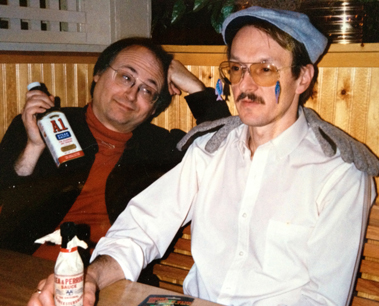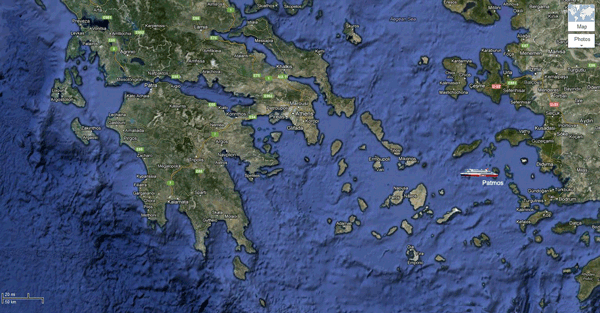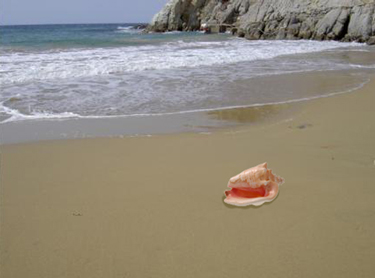John Donne said,
No man is an island, but these islands conceived man qua Western man — a nomadic fisher in infinite waters — an individual entity in a cosmic universe. He only joins confederacies to expel land sharks who would swallow his singularity. Ek Polloús Éna! An island mind sees itself forever at war with a boundless sea. Thus, he sinks the Persian fleet and, 2000 years later, the Spanish Armada.
Some decades ago, a friend of mine
 abandoned his land locked life and emigrated to another chain of islands in a much larger sea on the other side of the world.
He changed his name, became a disciple of Buddha, and recites his master's sutras daily. As I was writing this page, he asked me to review his recitation on You Tube, and so I did. See below. Unfortunately, after I commented on his sutra reading, he removed it from You Tube. I hope not because of anything I wrote below. What do I know, anyway? So as a substitute, I embed a morning greeting from his master, Ji Kwang Dae Poep Sa Nim herself. Enjoy...
abandoned his land locked life and emigrated to another chain of islands in a much larger sea on the other side of the world.
He changed his name, became a disciple of Buddha, and recites his master's sutras daily. As I was writing this page, he asked me to review his recitation on You Tube, and so I did. See below. Unfortunately, after I commented on his sutra reading, he removed it from You Tube. I hope not because of anything I wrote below. What do I know, anyway? So as a substitute, I embed a morning greeting from his master, Ji Kwang Dae Poep Sa Nim herself. Enjoy...
Dear Howie —
I listened to your reading of JiKwangDaePoepSaNim's sutra on negating negativity and positing positivity, and then how all good things will flow unto you, karma-wisely. It certainly makes sense in all languages and religions. May there always be a group of folks who maintain the pure undiluted expression of universals. Personally, for me, however, the universal expression of wisdom is boring, humorless, and dead. (That's why I want my tombstone to read: Never Take Advice From A Dead Man, with perhaps a little smiley face underneath the inscription.) What I prefer to see and hear are individual expressions unique to a specific time and place, such as, for example, Kenny Rogers' famous Gambler song —You gotta know when to hold 'em, know when to fold 'em— which is also a sutra and says the same thing using a specific example of foolishness. It is along this style of expression that I am writing my retro-journal about a guy wandering around Europe surrounded by unlimited beauties of nature and art who does nothing but grumble about how hot it is, how distressed he is, and how hungry he is because he is too cheap to buy an extra canoli.
To be clear, I was not wanting to ask your master if I should write this book. I am writing it anyway urged on by a former student who was curious about my journey for some reason. What I want to know is: will it harm or help others — specifically, the little girl I am writing it for? If JiKwangDaePoepSaNim says it will kill a million people, I will reconsider the way I am writing it. (We can never really know everyone we have affected, or infected.) On the other hand, if she says, as I expect her to say, that it is insignificant and will neither harm nor help anyone, then I will continue writing it as exploratory self-therapy.
I realize that the western ways of story-telling are solipsistic and negative, a way of thinking inherited from the Greeks, along with the scientific method based on skepticism rather than positive belief. The karma of science has brought us wonderful technologies such as You Tube; but, karma-wise, it has also brought us separation from our natural authentic selves. My favorite movie last year wasThe Tree of Lifebased on Heidegger's critique of technology. Heidegger, you probably know, was the Nazi philosopher who analyzed pre-socratic writings until he gave them up for song. Eventually, most of Greek culture did the same.
Although I prefer the quietness of monasteries as opposed to night clubs where I, like you, ¿wurked? for 20 years, there is something walking deadly about a group of monks that makes me long for the arrogant egotism of a Donald Trump. Both extremes are equally uncomfortable for me to tolerate for very long. Members of religious groups do not seem to be very comfortable in their bodies or minds, and that makes me antsy too. There is some shared obsession, call itcollective narcissism, where disciples of the cult can only talk about their master and his beliefs. I eventually learned that I being a disciple of anyone or any idea only drove people away; whereas, listening to an individual as if they were telling a detective story, gave me a direct insight into why they were suffering, and moreover, they learned also simply by my listening. The ear is mightier than the pen. We are only saved from our narcissisms by directing our empathy outward.
I am not opposed to people suffering, but I do want them to know how their attachments make them suffer, and to realize they have a choice. That may be the most any of us can do for another. Certainly nothing I say will change them. Nevertheless, being somewhat of an arrogant egotist, in my own humble way, I try to say something that will change them, anyway. Rather foolish of me. Smarter to leave them with a question.
About that enlightenment thingy...as your master may have told you, what you do before and after enlightenment is more important than the enlightenment. You know you have been enlightened the same way you know you are in love. After enlightenment you know you have been where there areSince all attachments must die before enlightenment, you also know by now that desiring enlightenment denies enlightenment. Those of us that remember it most likely did not know what it was. Like most adolescent boys, our brains were undergoing hormonal changes more extreme than adolescent girl brains, and we were literally insane. (Andrew Newberg, who studied the brains of Tibetan monks in meditation, would say that our posterior superior parietal lobes had shut down.) Most of us quickly fell in love as a reaction to our hormonal changes, but a few of us heard a bible passage, did some yoga, or read Alan Watts, and — boom! — were suddenly in a Greater Other Dimension with the characteristics listed above. It may have lasted only for a moment or a minute — a twinkling of the eye — but it changed our lives forever. We could no longer get a regular job, for example, because the interviewer would know immediately we cared not for his worldly ways, and could see we were laughing inside at why we were there. However, on the positive side, we also would never suffer like our friends over trivialities like money, family, and social position. Moreover, death would no longer be a problem where we were driven to seek immortality via ancient and contemporary myths. As you may recall, I made a Gilgamesh movie on the subject starring a chess pawn.
- no boundaries
- no things
- no time
- no space
- no self
- no god
- no other
- no thought
- no words
- no sensation
As we grow older, daily meditations replace the sudden bipolar flash of a mystical occurrence. Enlightenment occurs gradually with stability and endurance. It sustains itself. You may be enlightened already and not know it because your mind/brain is more mature and less likely to explode with sudden illuminations that you have heard about. Do not envy those who have had these outbursts because deep depression usually follows, as one of the many St. John's describes in his tomeThe Dark Night of the Soul. It may be, then, that you have already arrived at the station, and can exit the train anytime at your leisure. You do not need to wait for your conductor to tell you that you have arrived. You will know it. Someday, I hope to turn some corner in some city and there will be some old guy, wearing sunglasses and a Greek fishing cap, with a beard as long as ZZ Top's, playingStarduston his saxophone.When that happens, I am going to think of you and wonder
How did Howie at last achieve enlightenment?8 )





